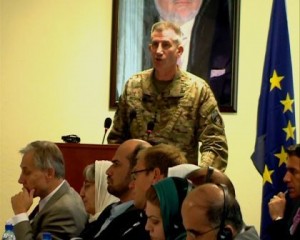Latest News
More than 12700 International Troops to remain in Afghanistan beyond 2016: Nicholson

The commander, Resolute Support Mission and United States Forces – Afghanistan Gen, John W. Nicholson in brief has stated that some the Afghan unit’s leaders are plugged with poor leaderships, incompetence and corruption, they need to be replaced, to shape and set the conditions for the security forces to seize the initiatives and take the fight to enemies and the counter insurgency.
He also urged that there more than 12700 ally soldiers are committed to remain in Afghanistan beyond 2016.
The European Union Special Representative in Afghanistan Franz-Michael Skjold Mellbin stated that too many within the police forces their loyalty not to the Ministry not to their superiors to people to belong to power structures outside of the Ministry and outside of the state.
The commander, Resolute Support Mission and United States Forces – Afghanistan Gen, John W. Nicholson said,” As your vision states you need leaders and officers ready to work harder, change attitudes and practices, be open to new ideas, stop the old ways of doing things, some units are plugged with poor leaderships, incompetence and corruption, so just as we have heroes like lieutenant Akbar, we also have leaders who are corrupted and need to be replaced Sergeant Major Roshaan said if we do not eliminate corruption, corruption will eliminate us, despite of many successes we have much work to do together, know that we are with you in this hard work, but increasing more and rest on your leadership and on eliminating corruption.”
He further went on and talked about the numbers of the International troops to remain in Afghanistan.
The commander, Resolute Support Mission and United States Forces – Afghanistan Gen, John W. Nicholson said ,” There more than 12700 allied soldiers are committed to remain in Afghanistan beyond 2016, this allows our partnership and the train advises and assist mission to continue and to extend to all police zones corps 2017 and heads the US authority which have been granted by the President Obama will help to shape and set the conditions for the security forces to seize the initiatives and take the fight to enemies and the counter insurgency.”
Meanwhile the European Union Special representative to Afghanistan at the end of their police support mission in Afghanistan has insisted on tackling corruption within the Afghanistan’s police queue.
The European Union Special Representative in Afghanistan Franz-Michael Skjold Mellbin said,” We still in situation we are far too many within the police forces or their loyalty not to the Ministry not to their superiors to people to belong to power structures outside of the Ministry and outside of the state, that needs to be tackled, this is a key challenge, it’s still very real and it endures the future development of the Afghan police if it’s not tackled and addressed in focused way.”
Chief executive of the National Unity Government Abdullah Abdullah said,” that we need to tackle against corruption, and practical steps should be taken, otherwise corruption will cause that no uniforms and foods to be reached to the hands of the Afghan security forces in the right time.”
He also mentioned that the Afghanistan’s enemies do not have trust on peace negotiation, insecurity will be enforced in Afghanistan till the foreign supports for the terrorists doesn’t stop, demanding the Afghan security forces the political tensions should not impact on their morals.
Reported by Fawad Nassiri

Latest News
IFRC calls for rethink of approaches to humanitarian aid to Afghanistan

The humanitarian situation in Afghanistan is gravely deteriorating, and a new approach is urgently needed, the International Federation of the Red Cross and Red Crescent Societies (IFRC) said on Friday.
In a statement, IFRC said that without a radical rethink of approaches to humanitarian aid, the root causes of the crisis cannot be tackled sustainably, as time and funding are running out.
“We have been responding with emergency aid in Afghanistan for years now, and it is time for a rethink,” said Alexander Matheou, IFRC Regional Director for Asia Pacific. “We need to focus on Afghan institutions like the Afghan Red Crescent, which have a permanent role in the country. Their capacity is durable and will serve people before and after aid operations. We need to adapt our programming to focus on resilience and economic independence while still showing solidarity and providing assistance after sudden shocks like the Herat earthquake and the current floods.”
He went on to reiterate the IFRC’s call for investment in people.
“With limited access to education and jobs, we need a focus on youth, on professional and vocational training, and other learning opportunities—interventions designed to boost confidence and give hope. Otherwise, the future really does look grim.”
This call comes ahead of a partnership meeting hosted in Doha by the Afghan Red Crescent Society in cooperation with the Qatar Red Crescent Society and attended by participating national societies from Britain, Canada, Denmark, Finland, Germany, Italy, Japan, Kuwait, Norway, Sweden, Singapore, and Türkiye, as well as the Hong Kong Special Administrative Region of China.
“Communities are lurching from crisis to crisis at a time when their resilience is sub-zero and their coping mechanisms are exhausted. We ask our valued partners to take a long-term view and commit to tackling the root causes of the humanitarian crisis sustainably by investing in Afghan capacity, people, and systems,” said Mutiul Haq Khales, the Acting President of the Afghan Red Crescent Society.
“The needs of over 24 million people are vast and interconnected. Many have been caused by a combination of lingering impacts from decades-long conflict, climate shocks, and a deep economic crisis. The country’s resources are stretched, but capacities exist, and it is important that solutions are implemented to address the root causes of all these overlapping needs,” he added.
Latest News
AWCC launches telecom services in Kunar’s Noor Gul district
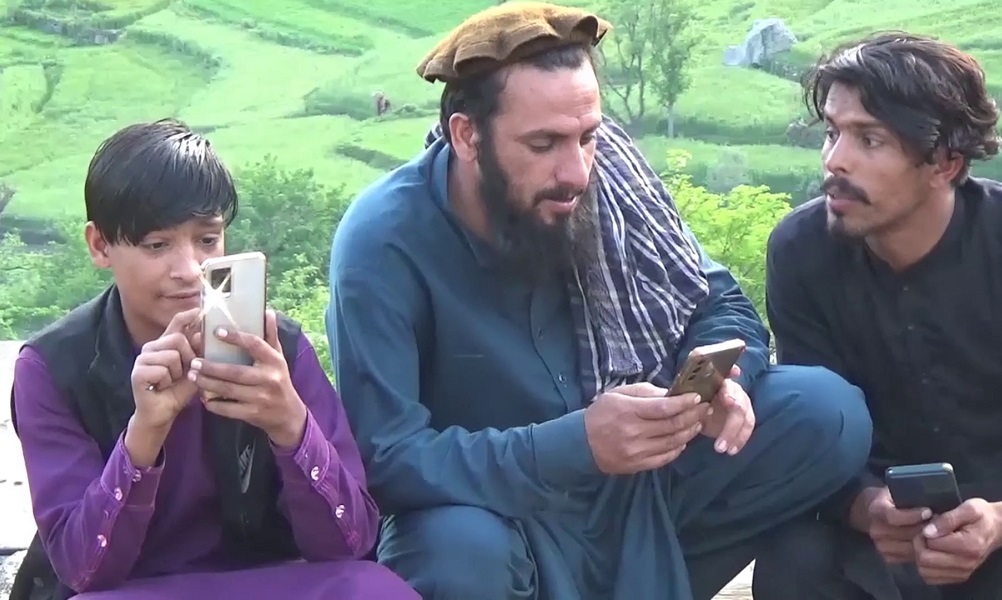
Afghan Wireless Communication Company (AWCC) has rolled out its telecommunication services in Noor Gul district of Kunar province, becoming first company to launch telecom services in the district.
Noor Gul had been deprived telecommunication services in addition to other basic life facilities.
“Telecommunication services have been launched here for the first time. The population here is very large. Many people will benefit from the services. We are trying to connect this site, which is currently connected to satellite, to Microlink in the near future,” said Attaullah Sahil, head of AWCC in the eastern zone.
The officials of Kunar Directorate of Communications welcomed the AWCC’s move.
“Around 500 families live here. Its population is about 10,000 people. Telecommunication services and facilities are provided for them. We appreciate these AWCC services,” said Abdul Wali Marshall, Kunar’s director of communications.
Jalal al-Din Shams, the spokesperson of Afghanistan Telecom Regulatory Authority (ATRA), stated: “Unfortunately, since the day that telecommunication services have started in Afghanistan, there has not been enough attention to quality. The previous governments did not pay attention to it. Fortunately, a process has started now with which ATRA and the Ministry of Communications can bring about many changes in quality.”
Residents of Noor Gul district, who previously faced many problems due to lack of access to telecommunication services, expressed their satisfaction with the latest move by AWCC.
“There was no telecommunication service here,” said Rozi Khan, a resident of Noor Gul district. “This is the first time that AWCC services have been launched here and we are very happy. We also want 3G and 4G services for more convenience. During 20 years, the government paid no attention to this valley.”
Security officials assure of providing full security.
“There were many problems here due to the lack of telecommunication services. For an ordinary call, people used to pay 300 or 400 afghanis. We assure all telecommunication companies that there is no problem in the area of security,” said Fazlur Rahman Zarqawi, the police commander of Noor Gul district.
With the improvement of security situation in the country after the Islamic Emirate’s takeover, AWCC has launched telecom and internet services in many remote areas.
Latest News
Afghan journalists ‘must be celebrated, supported and protected’: UNAMA
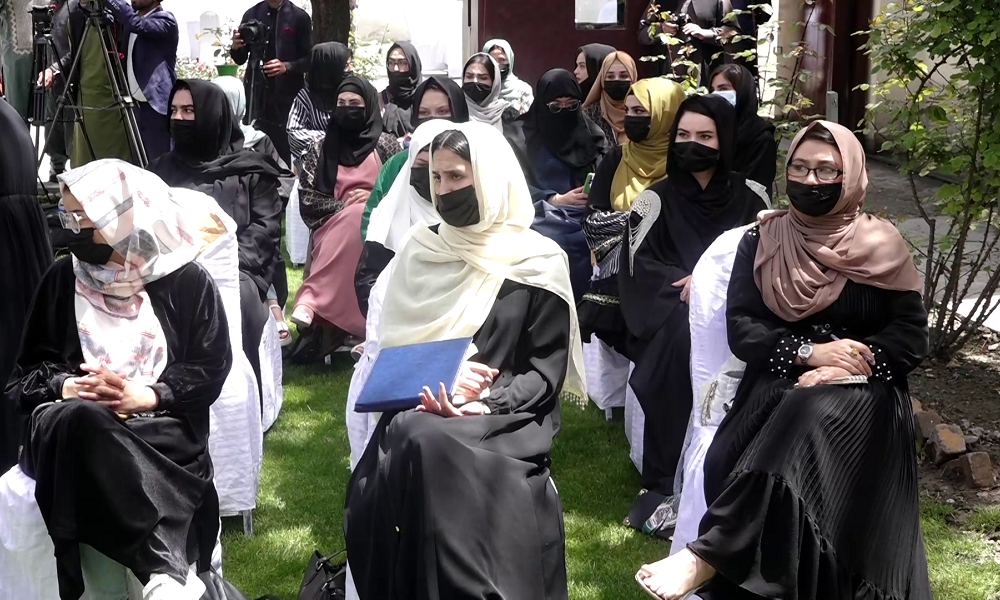
The United Nations Assistance Mission in Afghanistan (UNAMA) said Friday in a statement marking World Press Freedom Day that Afghan journalists “must be celebrated, supported and protected.”
“As we mark World Press Freedom Day, we pay tribute to journalists across Afghanistan who are doing their best to keep the nation informed, often at great risk. Their work is essential for an informed and prosperous nation and for action on education, the environment, health, the economy, and good governance for all Afghans. They must be celebrated supported, and protected,” the statement reads.
Meanwhile, the US Embassy in Qatar, which operates in Qatar, also said that Afghan journalists are facing many problems in carrying out their media activities, and the activities of female journalists are still limited in this country.
Some journalists also ask the government to support the media and journalists.
“We ask the Islamic Emirate officials to approve the law on mass media and the law of access to information as soon as possible so that journalists can carry out their work following these laws,” said Haidar Nazari, a journalist.
Reporters Without Borders in its latest ranking of media freedom, recognized Afghanistan as one of the most dangerous countries for journalists and added that the country has fallen from 152nd to 178th place.
“The state of the Afghan media in the economic sector and the country’s journalists are in a bad economic situation, this matter should be taken seriously. Otherwise, publishing statements and declaring support for the media community will not be effective,” said Hojatullah Mujadadi, the head of Afghanistan Free Journalists’ Association (AFJU).
The IEA officials have repeatedly emphasized that they are committed to supporting freedom of speech and media activity in the country in accordance with Islamic values and national interests, and they are trying to provide reliable and timely information to journalists.
-
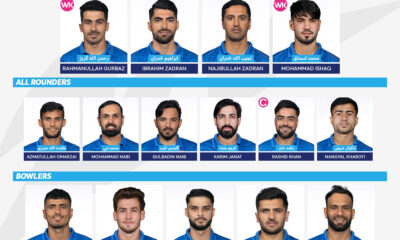
 Sport3 days ago
Sport3 days agoAfghanistan announce T20 World Cup 2024 squad
-

 Sport5 days ago
Sport5 days agoKohli slams strike-rate talk and pundits ‘from the box’
-
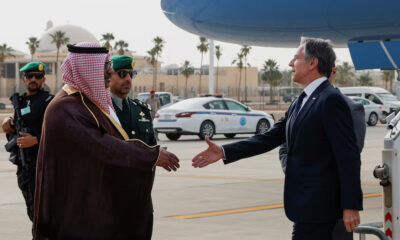
 World5 days ago
World5 days agoBlinken arrives in Saudi Arabia to discuss Israel normalization, post-war Gaza
-

 Health5 days ago
Health5 days agoNationwide polio vaccination campaign kicks off across Afghanistan
-
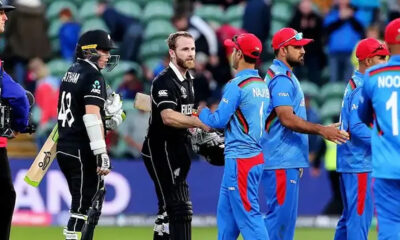
 Sport3 days ago
Sport3 days agoNew Zealand to go ahead with Afghanistan cricket Test
-

 Science & Technology5 days ago
Science & Technology5 days agoMercedes Benz unveils electric G-class at Beijing Auto Show
-

 Sport4 days ago
Sport4 days agoKolkata Knight Riders hammer Delhi Capitals in heatwave-hit IPL
-
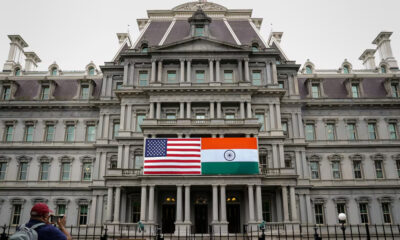
 Regional4 days ago
Regional4 days agoReported Indian role in assassination plots a ‘serious matter’, White House says

